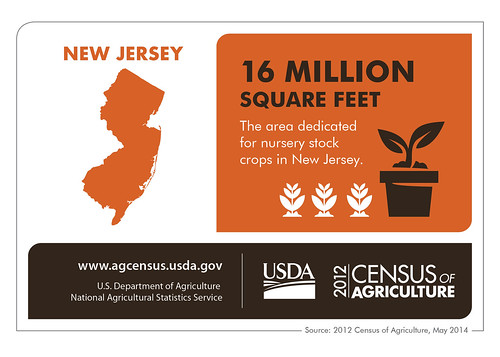
The Census of Agriculture is the most complete account of U.S. farms and ranches and the people who operate them. Every Thursday USDA’s National Agricultural Statistics Service will highlight new Census data and the power of the information to shape the future of American agriculture.
The 2012 Census of Agriculture results are out and New Jersey remains true to its name. The Garden State greenhouse industry keeps blossoming. There are more than 1,560 farms in New Jersey that focus on greenhouse, nursery, and floriculture production. In the five year period since the last census, square footage for nursery stock crops in New Jersey more than doubled from 7.8 million square feet to 16 million. And greenhouse tomatoes went from 162,000 square feet to 275,000.
Speaking of vegetables, that’s another sector of New Jersey agriculture that bears mentioning. With more than 50,000 acres of farmland dedicated to vegetables, our farmers grow nearly every vegetable included in the census. Tomatoes, New Jersey’s state vegetable, lead this charge, with 688 vegetable farms, more than half of the total, growing this crop. Other key crops grown locally include bell peppers, cucumbers, sweet corn, and snap peas.
New Jersey farmers also make a strong effort to see that their produce reaches consumers, which is why nearly 1,800 farms sell their products directly to their clients and 88 farms participate in community supported agriculture marketing arrangements. In fact, many of the more than 100 varieties of fruits, vegetables, and herbs grown locally are not available in supermarkets. For example, 80 percent of all apples grown in New Jersey are available only through farmers markets, roadside stands and pick-your-own farms.
Some other interesting tidbits about New Jersey farming are that it:
- Ranks fourth in the nation in the value of market products sold per acre at $1,408, which is more than three times the national average;
- Has the highest percentage of farms with horses east of the Rockies; and
- Nine of New Jersey counties rank in the top 10 percent in the nation in agritourism sales.
As you can see, farming is a key part of New Jersey and our farmers have proven to be great stewards. To date, we have preserved about 207,000 acres of farmland under the state farmland preservation program – or about 29 percent of available agricultural lands (the highest percentage of any state in the nation) according to the State Agriculture Development Committee. In addition, 591 New Jersey farms now produce energy on their own operation. There are also 85 certified organic farms and handlers in New Jersey, highlighting even stronger commitment by our producers to the environment.
This is just the tip of the iceberg of our local agriculture. Our farmers and ranchers work day and night to ensure that New Jersey keeps living up to its Garden State moniker.
